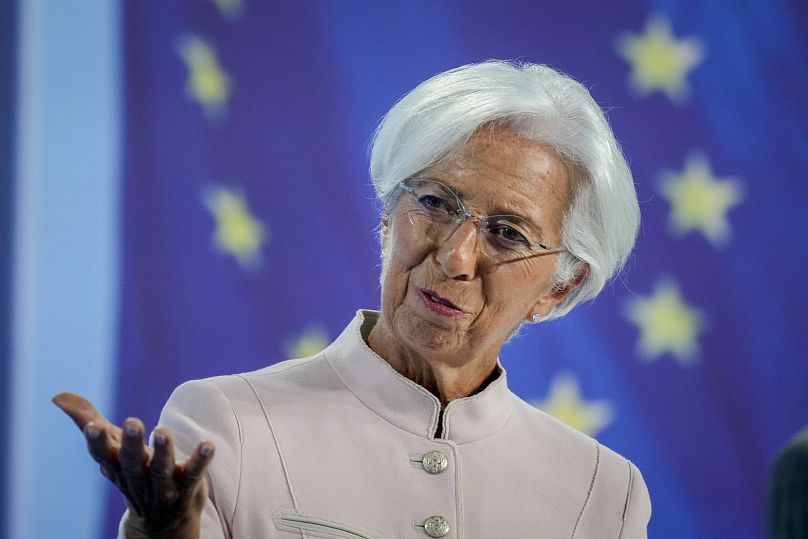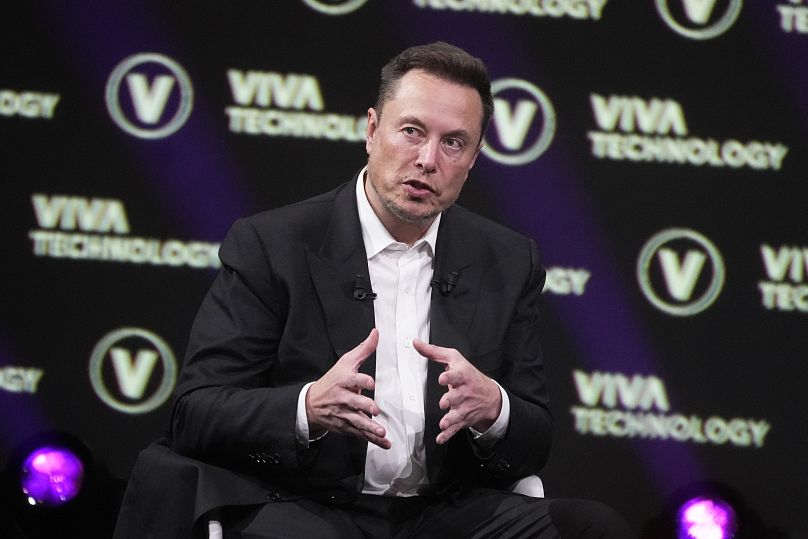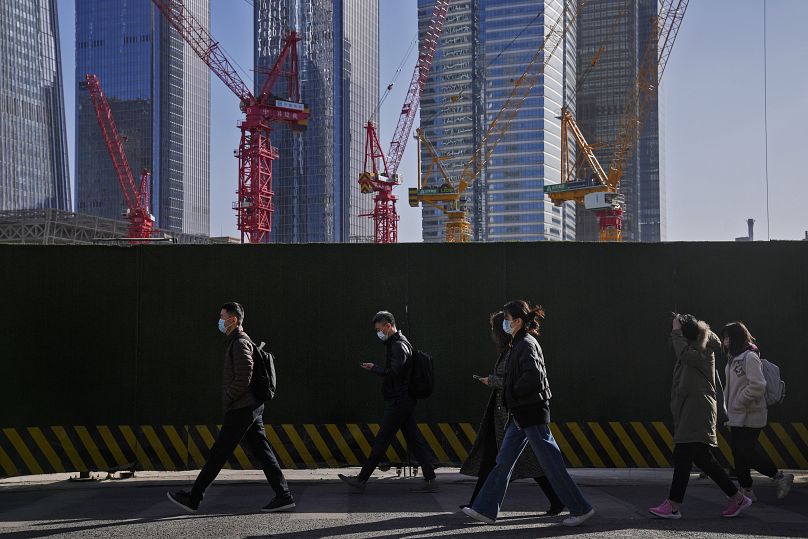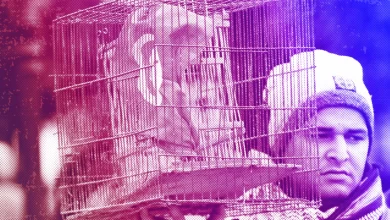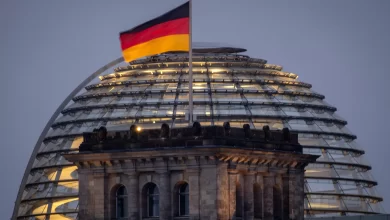Inflation, AI and Elon Musk: Five business stories that dominated 2023

Euronews Business looks back at five business stories that dominated the global landscape this year.
World events have drastically impacted the European business, economic and market landscapes over the past year, from rampant inflation to the surge in AI.
Here’s a quick recap of five of the most important, long-running business stories that shaped 2023.
The battle against inflation
The European Central Bank (ECB), alongside other major central banks, focused its efforts throughout the year on addressing the highest levels of inflation witnessed in four decades, mainly by enacting tight monetary policy measures.
This surge in inflation originated as the global economy lept out of the pandemic-induced recession of 2021 and 2022, leading to disruptions in supply chains and soaring prices.
By the end of 2023, the ECB, along with the US Federal Reserve (Fed) and the Bank of England, decided to freeze interest rates after months of increases to try and bring inflation down.
Aggressive interest rate hikes had effectively tempered inflation from its peak in 2022, largely influenced by Russia’s invasion of Ukraine, which resulted in significant spikes in energy and grain prices.
“Should we lower our guard?” Christine Lagarde, the ECB president, told reporters. “We ask ourselves that question. No, we should absolutely not lower our guard.”
While the ECB signalled a cautious approach, indicating that inflation was declining but remained above their target levels, the Fed took a different stance by suggesting three possible rate cuts in 2024, contrary to prior expectations of rate hikes.
The Council on Foreign Relations think tank, monitoring interest rates across 54 nations, noted that central banks, including the ECB, took aggressive measures against inflation in the spring of 2022. Although policies remain stringent, there has been an overall easing of the anti-inflation stance throughout 2023.
The rise of AI and its regulations
Artificial intelligence (AI) made a significant impact on the public consciousness this year. However, despite its impressive achievements in data retrieval and content generation, it still falls short of the human-like machines depicted in popular science fiction.
One of the highlights fueling this year’s excitement about AI was ChatGPT. The chatbot provided insight into computer science advancements, although not everyone grasped its inner workings or efficiently utilised its full potential.
AI usage sparked disputes among Hollywood writers and actors, as well as legal wrangles.
In September, 17 authors, including John Grisham, Jodi Picoult, and George RR Martin, filed a lawsuit against OpenAI, accusing them of “systematic theft on a mass scale.” This legal action stands among various measures undertaken by concerned writers, all directed at confronting the unauthorised use of their copyrighted works by AI programmes.
As the year neared its end, European Union negotiators reached a deal on the world’s first comprehensive artificial intelligence regulations, establishing legal oversight for AI technology poised to revolutionise daily life and prompting warnings of existential threats to humanity.
“The EU becomes the very first continent to establish clear rules for AI use,” said European commissioner Thierry Breton, praising the act.
From Twitter to X: Elon Musk’s provocative transformation
About a year ago, Elon Musk took charge at Twitter’s San Francisco headquarters, replacing its CEO and top executives and initiating changes that transformed the platform into what’s now called X.
Since then, the company has faced numerous challenges, including allegations of spreading misinformation, a significant decrease in advertising revenue, and a decline in user engagement.
Disney, Comcast and other high-profile advertisers stopped spending on X after a report by Media Matters, a liberal advocacy group, revealed that their ads appeared alongside content praising Nazis.
X Corp filed a lawsuit against the group, accusing them of having “manufactured” the report to damage the platform and its advertisers.
The situation escalated when Musk, in a passionate interview, used strong language to criticise companies that stopped advertising on X. He accused them of “blackmail” and, using profanity, essentially told them to get lost.
He appeared to specifically call out Walt Disney Co CEO Bob Iger, saying, “Hey Bob, if you’re in the audience… that’s how I feel”.
Global markets rally
From Austria to New Zealand, stock markets rallied through 2023. As inflation eased, stocks climbed despite sluggish global economic growth.
The drop in crude oil prices helped ease inflation pressures. The price of Brent crude, the international benchmark, fell by 14% by mid-December due to expectations that the global oil supply would surpass demand.
An index that includes nearly 3,000 stocks from 47 countries returned 18% in US dollar terms as of 11 December. Strong performances by US tech giants like Apple and Nvidia drove a significant portion of these gains.
In Europe, the Danish pharmaceutical company Novo Nordisk saw a 45% return, driven by sales of the obesity treatment drug Wegovy, while the Dutch semiconductor company ASML experienced a 33% return.
The bond market faced more turbulence with bond prices declining for a substantial period during the year, leading to rising yields. This was due to uncertainties surrounding the extent of central banks’ rate hikes aimed at curbing inflation.
Within the Eurozone, yields dropped to their lowest in nine months as investors centred on recent indications of an economic slowdown, disregarding the ECB’s assurance that it wasn’t contemplating interest rate reductions.
World economy’s resilience
In the past three years, the world economy endured consecutive blows – a severe pandemic, disruptions in energy and grain markets due to Russia’s full-scale invasion of Ukraine, a resurgence in inflation, and high interest rates.
And yet economic output kept growing in 2023, if only moderately. Optimism grew about a “soft landing” – a scenario where elevated rates control inflation without triggering a recession. The head of the International Monetary Fund, Kristalina Georgieva, praised the global economy for its “remarkable resilience”.
The US led this resilience. Contrary to forecasts of a US recession due to high rates, the largest global economy continued to expand. Fuelled by robust consumer spending, businesses sustained healthy hiring rates.
However, the series of shocks has put a brake on growth. The International Monetary Fund anticipates a mere 2.9% global economic expansion in 2024, down from an expected 3% this year. A major concern is a weakened China, the world’s second-largest economy. Its growth is affected by a collapsed real estate market, dwindling consumer confidence, and high rates of youth unemployment.
